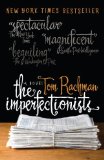Summary | Excerpt | Reading Guide | Reviews | Beyond the Book | Readalikes | Genres & Themes | Author Bio

A Novel
by Tom Rachman
"No news. Just a feature."
"You have anything else?"
Lloyd scratches at his pad again. "How about a business piece on wine: sales of rosé outstripping white for the first time in France."
"Is that true?"
"I think so. I still have to double-check."
"Do you have anything more timely?"
"You don't want the ortolan?"
"I don't think we have space for it. It's a tight day-four pages in news."
All the other publications Lloyd freelanced for have dumped him. Now he suspects that the paper-his final string, his last employer-is looking to send him away, too.
"You know our money problems, Lloyd. We're only buying freelance stuff that's jaw-dropping these days. Which isn't saying yours isn't good. I just mean Kathleen only wants enterprise now. Terrorism, nuclear Iran, resurgent Russia-that kind of thing. Anything else we basically take from the wires. It's a money thing, not about you."
Lloyd hangs up and returns to the window, gazing out at Sixth Arrondissement apartment buildings, white walls dirtied where rain drizzled and drainpipes leaked, the paint peeling, shutters closed tight, courtyards below where residents' bicycles huddle, handlebars and pedals and spokes jammed into each other, zinc roofs overhead, capped chimney pipes streaking white smoke across white sky.
He walks over to the closed front door and stands still, listening. She might come back from Didier's unbidden. This is their home, for Christ's sake.
When the dinner hour arrives, he bangs about as clamorously as possible, crashing the door into the coatrack, simulating a coughing fit on his way out, all to ensure that Eileen across the hall hears him leaving for his supposed dinner plans, although no such plans exist. He simply will not sit down for another charity meal with her and Didier. He wanders down Boulevard du Montparnasse to kill time, buys a box of calissons to give to his daughter Charlotte, and returns home, as stealthy now as he was noisy before. When he enters the apartment, he raises the front door on its hinges to dull the squeak, clicks it gently shut. He doesn't turn on the main light-Eileen might see it under the door-and fumbles in the kitchen, leaving the fridge ajar for illumination. He opens a can of chickpeas and digs straight in with a fork, catching sight of his right hand, which is mottled with age spots. He switches the fork to his left hand, the decrepit right thrust deep in his trouser pocket, hugging a thin leather wallet.
Been broke plenty of times. Always spent better than he saved. On tailored shirts from Jermyn Street. Cases of Château Gloria 1971. Shares in a racehorse that almost landed in the money. Impromptu vacations to Brazil with impromptu women. Taxis everywhere. He takes another fork of chickpeas. Salt. Needs salt. He drops a pinch into the can.
At dawn, he lies under layers of blankets and bedcovers-he doesn't use the heating anymore unless Eileen is here. He'll visit Charlotte today, but doesn't relish it. He turns on his other side, as if to flip from her to his son, Jérôme. Sweet kid. Lloyd flips again. So awake, so weary. Lazy-he's become lazy. How did that happen?
He forces off the covers and, shivering in his underwear and socks, makes for his desk. He pores over old phone numbers-hundreds of scraps of paper, stapled, taped, glued in place. Too early to call anyone. He grins at names of former colleagues: the editor who cursed him out for missing the first Paris riots in '68 because he had been drunk in the bathtub with a lady friend. Or the bureau chief who flew him to Lisbon to cover the coup in '74, even though he couldn't speak a word of Portuguese. Or the reporter who got the giggles with Lloyd at a Giscard d'Estaing presser until they were flung out and upbraided by the press secretary. How many of these ancient numbers still work?
Excerpted from The Imperfectionists by Tom Rachman Copyright © 2010 by Tom Rachman. Excerpted by permission of The Dial Press, a division of Random House, Inc. All rights reserved. No part of this excerpt may be reproduced or reprinted without permission in writing from the publisher.
Chance favors only the prepared mind
Click Here to find out who said this, as well as discovering other famous literary quotes!
Your guide toexceptional books
BookBrowse seeks out and recommends the best in contemporary fiction and nonfiction—books that not only engage and entertain but also deepen our understanding of ourselves and the world around us.